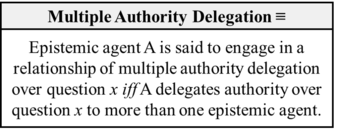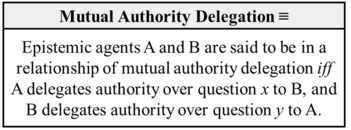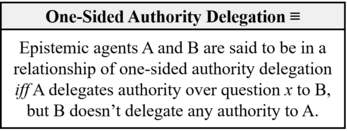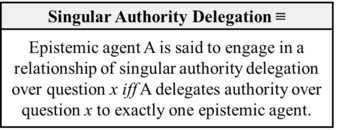Modification:Sciento-2019-0017
Accept the definitions of authority delegation, and its subtypes, that generalize the currently accepted definitions to apply to all epistemic agents, rather than only communities.
The modification was suggested to Scientonomy community by Paul Patton on 26 December 2019.1 The modification was accepted on 6 February 2023.
Contents
Preamble
The current scientonomic definition of authority delegation, formulated by Nicholas Overgaard and Mirka Loiselle, characterizes it as a relationship between communities.2 However, Loiselle's own examples of authority delegation in the community of art experts make it clear that an individual can be the subject of authority delegation.3 Similarly, it is safe to assume that authority delegation to individuals is likely to be ubiquitous in many fields of inquiry, especially within individual scientific labs.1 While the gist of the Overgaard and Loiselle's definition requires no alteration, the definition needs to be changed to ensure that it's applicable not only to communities but also to individuals. To that end, epistemic agent should be substituted for community in the definition of authority delegation as well as the definitions of all subtypes of authority delegation. Also, question should be substituted for topic, as the former is the proper scientonomic category here.4
Modification
Theories To Accept
- Multiple Authority Delegation (Patton-2019): Epistemic agent A is said to engage in a relationship of multiple authority delegation over question x iff A delegates authority over question x to more than one epistemic agent.
- Mutual Authority Delegation (Patton-2019): Epistemic agents A and B are said to be in a relationship of mutual authority delegation iff A delegates authority over question x to B, and B delegates authority over question y to A.
- Authority Delegation (Patton-2019): Epistemic agent A is said to be delegating authority over question x to epistemic agent B iff (1) agent A accepts that agent B is an expert on question x and (2) agent A will accept a theory answering question x if agent B says so.
- One-sided Authority Delegation (Patton-2019): Epistemic agents A and B are said to be in a relationship of one-sided authority delegation iff A delegates authority over question x to B, but B doesn’t delegate any authority to A.
- Singular Authority Delegation (Patton-2019): Epistemic agent A is said to engage in a relationship of singular authority delegation over question x iff A delegates authority over question x to exactly one epistemic agent.
- Hierarchical Authority Delegation (Patton-2019): A sub-type of multiple authority delegation where different epistemic agents are delegated different degrees of authority over question x.
- Non-Hierarchical Authority Delegation (Patton-2019): A sub-type of multiple authority delegation where different epistemic agents are delegated the same degree of authority over question x.
Theories To Reject
- Authority Delegation (Overgaard-Loiselle-2016): Community A is said to be delegating authority over topic x to community B iff (1) community A accepts that community B is an expert on topic x and (2) community A will accept a theory on topic x if community B says so.
- Mutual Authority Delegation (Overgaard-Loiselle-2016): Communities A and B are said to be in a relationship of mutual authority delegation iff community A delegates authority over topic x to community B, and community B delegates authority over topic y to community A.
- One-sided Authority Delegation (Overgaard-Loiselle-2016): Communities A and B are said to be in a relationship of one-sided authority delegation iff community A delegates authority over topic x to community B, but community B doesn’t delegate any authority to community A.
- Multiple Authority Delegation (Loiselle-2017): Community A is said to engage in a relationship of multiple authority delegation over topic x iff community A delegates authority over topic x to more than one community.
- Singular Authority Delegation (Loiselle-2017): Community A is said to engage in a relationship of singular authority delegation over topic x iff community A delegates authority over topic x to exactly one community.
- Non-Hierarchical Authority Delegation (Loiselle-2017): A sub-type of multiple authority delegation where different communities are delegated the same degree of authority over topic x.
- Hierarchical Authority Delegation (Loiselle-2017): A sub-type of multiple authority delegation where different communities are delegated different degrees of authority over topic x.
Questions Answered
This modification attempts to answer the following question(s):
- Authority Delegation: What is authority delegation? How should it be defined?
- Mutual Authority Delegation: What is mutual authority delegation? How should it be defined?
- One-sided Authority Delegation: What is one-sided authority delegation? How should it be defined?
- Singular Authority Delegation: What is singular authority delegation? How should it be defined?
- Multiple Authority Delegation: What is multiple authority delegation? How should it be defined?
- Hierarchical Authority Delegation: What is hierarchical authority delegation? How should it be defined?
- Non-Hierarchical Authority Delegation: What is non-hierarchical authority delegation? How should it be defined?
Verdict
The modification was accepted on 6 February 2023. The commentators found the modification uncontroversial.c1 c2 It was noted that the modification "merely attempts to capture what is already de facto accepted - namely, the idea that authority can be delegated by and to epistemic agents of all kinds (both communal and individual)" as indicated by the "fact that the canonical examples of authority delegation often involve individual experts (see, for example, Loiselle 2017)".c3 It was agreed that the modification "introduces a necessary rewording in the definitions of authority delegation and its species".c4
Click on the Discussion tab for comments.
References
- ^ Patton, Paul. (2019) Epistemic Tools and Epistemic Agents in Scientonomy. Scientonomy 3, 63-89. Retrieved from https://scientojournal.com/index.php/scientonomy/article/view/33621.
- ^ Overgaard, Nicholas and Loiselle, Mirka. (2016) Authority Delegation. Scientonomy 1, 11-18. Retrieved from https://www.scientojournal.com/index.php/scientonomy/article/view/27065.
- ^ Loiselle, Mirka. (2017) Multiple Authority Delegation in Art Authentication. Scientonomy 1, 41-53. Retrieved from https://www.scientojournal.com/index.php/scientonomy/article/view/28233.






